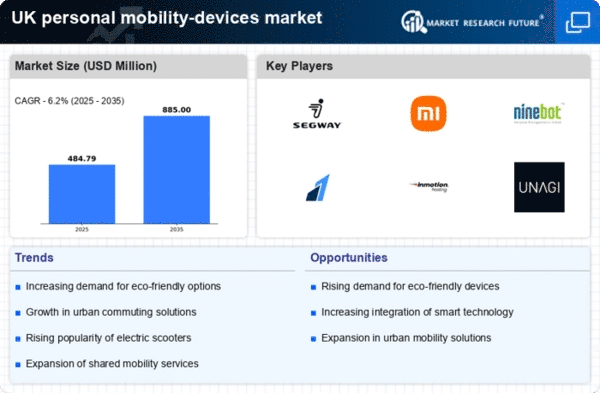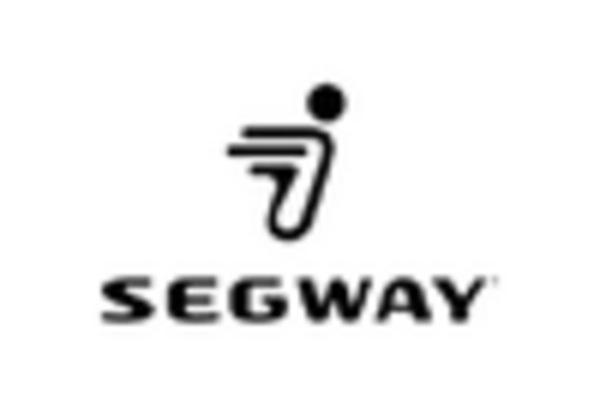Aging Population
The demographic shift towards an aging population in the UK significantly influences the personal mobility-devices market. As the population ages, there is a heightened need for mobility solutions that cater to the elderly, who may face challenges in traditional transportation. Personal mobility devices, such as mobility scooters and powered wheelchairs, offer independence and ease of movement for older adults. Recent statistics indicate that approximately 18% of the UK population is over 65, a figure projected to rise. This demographic trend suggests a growing market for personal mobility devices tailored to the needs of seniors, thereby driving innovation and investment in this sector.
Increasing Urbanisation
The ongoing trend of urbanisation in the UK is a pivotal driver for the personal mobility-devices market. As more individuals migrate to urban areas, the demand for efficient and compact transportation solutions rises. Urban environments often face congestion and limited parking, making traditional vehicles less practical. Consequently, personal mobility devices, such as e-scooters and electric bikes, are becoming increasingly popular. According to recent data, urban areas in the UK have seen a 25% increase in the adoption of these devices over the past year. This shift not only addresses transportation challenges but also aligns with the growing preference for eco-friendly alternatives, further propelling the personal mobility-devices market.
Rising Health Awareness
An increasing awareness of health and fitness among the UK population is emerging as a significant driver for the personal mobility-devices market. Many individuals are seeking alternatives to sedentary lifestyles, leading to a surge in the use of personal mobility devices for recreational purposes. E-bikes and scooters are not only seen as convenient transportation options but also as tools for promoting physical activity. Recent surveys indicate that around 40% of UK residents are considering personal mobility devices as a means to incorporate exercise into their daily routines. This trend is likely to enhance the appeal of the personal mobility-devices market, as consumers prioritize health and wellness.
Technological Integration
The integration of advanced technologies into personal mobility devices is a crucial driver for market growth in the UK. Innovations such as smart connectivity, GPS navigation, and enhanced battery efficiency are transforming the user experience. Consumers are increasingly attracted to devices that offer features like app integration for tracking usage and maintenance. The personal mobility-devices market is witnessing a surge in demand for tech-savvy solutions, with a reported 30% increase in sales of smart-enabled devices over the last year. This technological evolution not only enhances convenience but also aligns with the expectations of a tech-oriented consumer base.
Government Initiatives and Funding
Government initiatives aimed at promoting sustainable transportation are playing a vital role in shaping the personal mobility-devices market. The UK government has introduced various funding schemes and incentives to encourage the adoption of eco-friendly mobility solutions. These initiatives include grants for purchasing electric scooters and bikes, as well as investments in infrastructure to support their use. Recent reports indicate that government funding for personal mobility devices has increased by 15% in the past year, reflecting a commitment to reducing carbon emissions and enhancing urban mobility. Such support is likely to stimulate growth in the personal mobility-devices market, making these solutions more accessible to a broader audience.
















